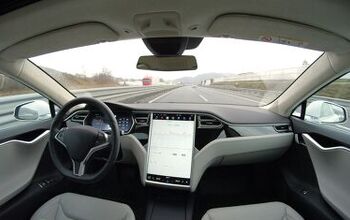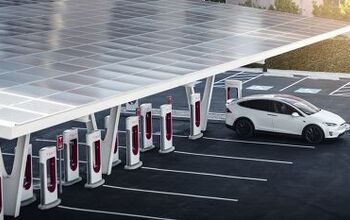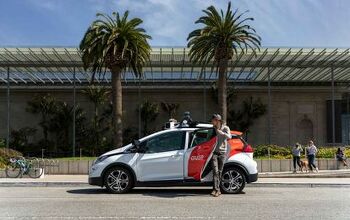Chart Of The Day: ExxonMobil Predicts Long Reign For The Internal Combustion Engine
The next 25 years of automotive powertrain technology belongs to the internal combustion engine, according to oil & gas giant ExxonMobil. While many will dismiss this as the wishful thinking of an industrial dinosaur, it’s worth remembering that 25 years isn’t that long of a timeframe in the automotive world.
As we speak, automakers are already planning for what products will be on the market within the next decade. As it stands now, they must meet increasingly stringent emissions targets in the United States and the European union by 2025, in the form of both CAFE and the next round of Euro regulations that call for a fleet average of 95 grams of CO2 per kilometer (for comparison, a Toyota Prius emits about 100 grams per km).
One way of meeting this target is through the use of hybrid technology – a sector that ExxonMobil sees as making rapid, substantial gains over the years. At this point, every single OEM has some kind of hybrid technology that can be adapted to their volume models in a way that is efficient in terms of both packaging and cost. This is sure to be the case for plug-in hybrid technology as well.
The zero-emissions front is substantially more fraught. The battle between battery electric vehicles (BEV) and hydrogen fuel cell vehicles has barely begun, but supporters of the two camps are already locked into a Betamax vs. VHS style conflict. As it stands, there is minimal infrastructure for both systems, and a combination of low oil prices and consumer skepticism is likely to stall its growth for the foreseeable future. And while BEVs technically have a head start on hydrogen, their market share is, in real terms, negligible.
In 2013, BEVs had a market share of just 0.28 percent, or about 260,000 units. Even the relatively scarce plug-in hybrid segment managed to best pure electrics, with 0.31 percent of the new car market. Only in Norway, where BEVs receive heavy subsidies in the form of tax breaks, have electric cars made any real headway, and even then, they have barely cracked 6 percent.
While tales of daring and disruption and averting cataclysmic climate change make for great headlines, the reality is that technological progress, especially in the automotive sector, moves at a much more gradual pace – otherwise, we’d likely have seen a major breakthrough in EV battery technology by now, one that would allow for significant range and negligible refueling times. Utopian visions of a fleet of silent, zero-emissions vehicles are just that. Instead, we are likely to see a proliferation of hybrid technology throughout new model lineups – and much of this will likely be driven by regulatory inputs, as a means of helping vehicles meet government mandated fuel economy targets, even if consumers don’t necessarily care.
Advances in the internal combustion engine are also on the horizon. Homogenous Charge Compression Ignition (HCCI) engines, which allow for diesel-like combustion while running on gasoline, are expected to debut on Mazda cars by 2020. Mazda claims that they will provide a 30 percent fuel economy boost, while significantly lowering emissions. Between HCCI, increasingly cleaner diesel engines and incremental improvements to traditional engines, the ICE powertrains are likely to be ubiquitous due to their familiarity and what is sure to be a cost advantage. Barring any major, prolonged spike in energy prices or a wholesale shift in attitudes towards climate change and the environment, dollars and cents (not to mention sheer convenience) will remain the primary motivating factor in new car purchases. And that means that the internal combustion engine is well placed to continue its dominance through the next quarter century.
More by Derek Kreindler
Latest Car Reviews
Read moreLatest Product Reviews
Read moreRecent Comments
- Probert They already have hybrids, but these won't ever be them as they are built on the modular E-GMP skateboard.
- Justin You guys still looking for that sportbak? I just saw one on the Facebook marketplace in Arizona
- 28-Cars-Later I cannot remember what happens now, but there are whiteblocks in this period which develop a "tick" like sound which indicates they are toast (maybe head gasket?). Ten or so years ago I looked at an '03 or '04 S60 (I forget why) and I brought my Volvo indy along to tell me if it was worth my time - it ticked and that's when I learned this. This XC90 is probably worth about $300 as it sits, not kidding, and it will cost you conservatively $2500 for an engine swap (all the ones I see on car-part.com have north of 130K miles starting at $1,100 and that's not including freight to a shop, shop labor, other internals to do such as timing belt while engine out etc).
- 28-Cars-Later Ford reported it lost $132,000 for each of its 10,000 electric vehicles sold in the first quarter of 2024, according to CNN. The sales were down 20 percent from the first quarter of 2023 and would “drag down earnings for the company overall.”The losses include “hundreds of millions being spent on research and development of the next generation of EVs for Ford. Those investments are years away from paying off.” [if they ever are recouped] Ford is the only major carmaker breaking out EV numbers by themselves. But other marques likely suffer similar losses. https://www.zerohedge.com/political/fords-120000-loss-vehicle-shows-california-ev-goals-are-impossible Given these facts, how did Tesla ever produce anything in volume let alone profit?
- AZFelix Let's forego all of this dilly-dallying with autonomous cars and cut right to the chase and the only real solution.


































Comments
Join the conversation
Back in the early 70's I bought recycled motor oil for about ten cents a quart. It was used motor oil that had all the impurities screened out and new additives added. My dad had an old Chevy II that leaked oil from the rear main bearing. I don't think that it is as much cost to recycle oil as it is that for a little more you can buy virgin oil and also many new vehicles use lower viscosity oil such as 0w20 which are synthetic. Oil itself does not wear out but the additives can break down and oil gets dirty. I do see over a period of time oil usage will drop with more efficient and cleaner engines and cleaner sources of energy. I doubt oil will go away but we will all use less of it.
I used to work (circa 1970) in the Corporate Planning Department of what is now called Exxon-Mobil. All the guys were smart. If that didn't do it, the company had on retainer guys who were even smarter in their field - this included, bye the bye, climate change and CO2 as seen by the cream of the scientific community in 1970. Our focus was corporate survival. Nobody is smart enough to see even one day into the future. Give them credit. Exxon-Mobil is well over a century old. By comparison, one of the great Big Three American car companies of 1970 is dead and a second is dying or on its way to China. Exxon-Mobil sees the same thing in fracking as any other informed and intelligent person sees. It is, most likely, a game changer that gives the internal combustion engine another two or three decades.